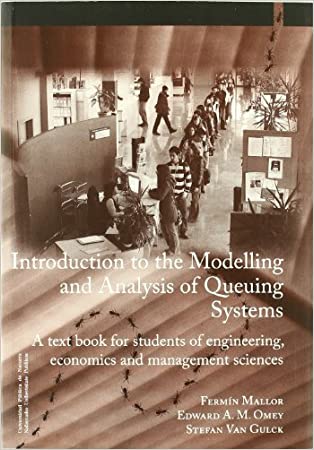 This book presents fundamental concepts and models of queuing theory ata an introductory level and provides useful analysis tools. Whitout losing the mathematical rigor, the contents ares exposed in a etepwise maner and are ilustrated by including many examples. The book is organised in seven chapters dealing with different topics of queuing theory and models, plus a last oner with the solutions to the exercises prposed at the end of these chapters. The first chapter introduces the notation and the structure of a queuing model as well as its performance measures and the decision problem associated when we consider its optimal dimensioning. In chapter two the foundations of Markov Chains are provided. Basic queuing models, based in birth and death processes, are studied in chapter three meanwhile the next chapter is devoted to extend theses markovian models. Chapter five analyses some simple non markovian queuing models. Chapter six addresses networks of queues at an introductory level. The last chapter uses the stochastic simulation as analysis tool for complicated queuing models. This book is intended for economics, management sciencies and engineering student that follow a course in operations research or decision methods.
This book presents fundamental concepts and models of queuing theory ata an introductory level and provides useful analysis tools. Whitout losing the mathematical rigor, the contents ares exposed in a etepwise maner and are ilustrated by including many examples. The book is organised in seven chapters dealing with different topics of queuing theory and models, plus a last oner with the solutions to the exercises prposed at the end of these chapters. The first chapter introduces the notation and the structure of a queuing model as well as its performance measures and the decision problem associated when we consider its optimal dimensioning. In chapter two the foundations of Markov Chains are provided. Basic queuing models, based in birth and death processes, are studied in chapter three meanwhile the next chapter is devoted to extend theses markovian models. Chapter five analyses some simple non markovian queuing models. Chapter six addresses networks of queues at an introductory level. The last chapter uses the stochastic simulation as analysis tool for complicated queuing models. This book is intended for economics, management sciencies and engineering student that follow a course in operations research or decision methods.
 This book presents fundamental concepts and models of queuing theory ata an introductory level and provides useful analysis tools. Whitout losing the mathematical rigor, the contents ares exposed in a etepwise maner and are ilustrated by including many examples. The book is organised in seven chapters dealing with different topics of queuing theory and models, plus a last oner with the solutions to the exercises prposed at the end of these chapters. The first chapter introduces the notation and the structure of a queuing model as well as its performance measures and the decision problem associated when we consider its optimal dimensioning. In chapter two the foundations of Markov Chains are provided. Basic queuing models, based in birth and death processes, are studied in chapter three meanwhile the next chapter is devoted to extend theses markovian models. Chapter five analyses some simple non markovian queuing models. Chapter six addresses networks of queues at an introductory level. The last chapter uses the stochastic simulation as analysis tool for complicated queuing models. This book is intended for economics, management sciencies and engineering student that follow a course in operations research or decision methods.
This book presents fundamental concepts and models of queuing theory ata an introductory level and provides useful analysis tools. Whitout losing the mathematical rigor, the contents ares exposed in a etepwise maner and are ilustrated by including many examples. The book is organised in seven chapters dealing with different topics of queuing theory and models, plus a last oner with the solutions to the exercises prposed at the end of these chapters. The first chapter introduces the notation and the structure of a queuing model as well as its performance measures and the decision problem associated when we consider its optimal dimensioning. In chapter two the foundations of Markov Chains are provided. Basic queuing models, based in birth and death processes, are studied in chapter three meanwhile the next chapter is devoted to extend theses markovian models. Chapter five analyses some simple non markovian queuing models. Chapter six addresses networks of queues at an introductory level. The last chapter uses the stochastic simulation as analysis tool for complicated queuing models. This book is intended for economics, management sciencies and engineering student that follow a course in operations research or decision methods.